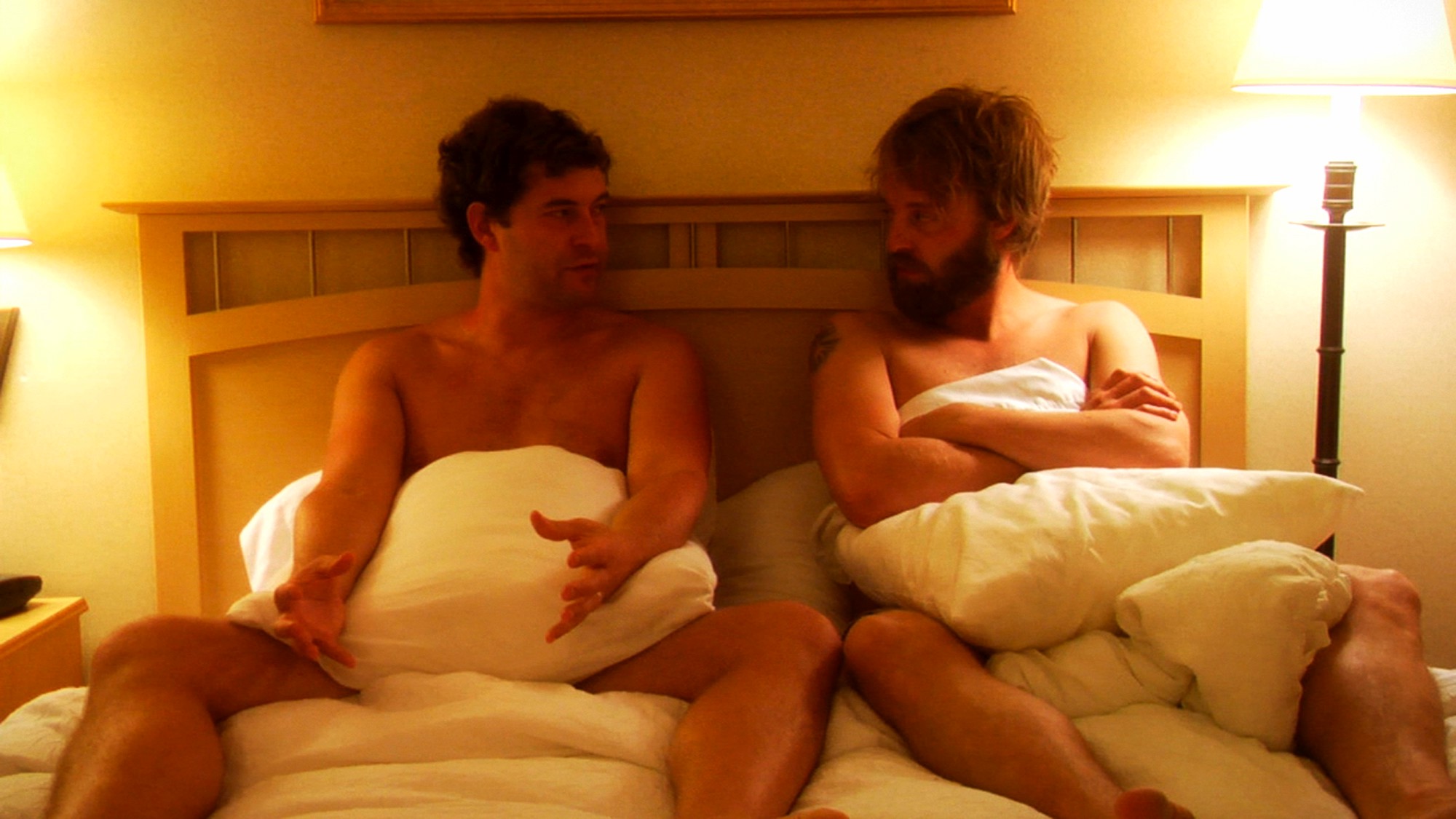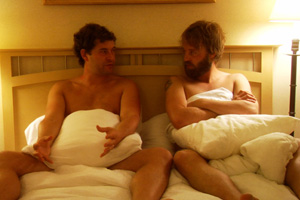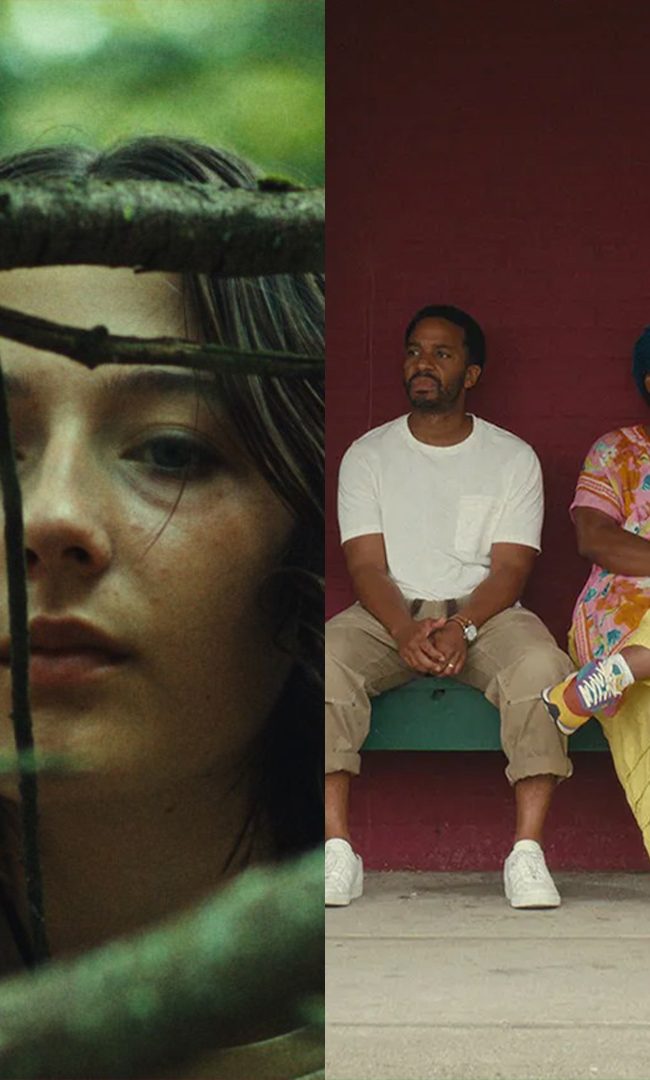
Guys are idiots. Even when they mean well, they’re still idiots. Lynn Shelton’s Humpday does nothing to disprove this theory, yet it also goes a surprisingly long way to understanding—if not explaining—the ludicrously misguided wiring that would lead two heterosexual male friends to videotape themselves having sex in the name of “art.”
This is, indeed, the premise of Shelton’s comedy, which doesn’t just give Humpday a drool-worthy marketing hook like no other micro-budget digital indie that has emerged of late. It also provides the film with a visceral narrative thrust that its festival-ready counterparts have lacked. Yet the best thing about Humpday is that it retains the personal attributes that make those micro-budget—okay, I might as well say it, Mumblecore—efforts so much more realistically credible than an absurd Hollywood production. Humpday is that special movie that has its cake and eats it too.
At one time, those aforementioned friends, Ben (Mark Duplass) and Andrew (Joshua Leonard), were more than just good buddies. Not in the touchy-feely way, mind you, but in the way that dudes can get. In college, they formed a heavy bond, fashioning themselves as Jack Kerouac and Dean Moriarty. But as happens, graduation disturbed all that. While Ben fell into a much steadier groove, working in a cubicle, buying a house, and marrying Anna (Alycia Delmore), Andrew headed in the other direction, traveling to obscure corners of the world, letting his beard grow, and living out his own personal version of On the Road. When Humpday begins, Andrew shows up unannounced on Ben’s doorstep late one night, and the unexpected reunion has commenced.
 This is understandably an uncomfortable situation for Ben, as he’s forced to reconcile his past life with his present one. For a very brief moment, he seems to have a handle on things. But the next day, when Andrew invites him over to the house of a girl he randomly met at a coffee shop (Shelton), that tug of war begins to rage. Over the course of a sloppy, substance-fueled night, while Anna sits at home watching her homemade pork chops get cold, Ben and Andrew party like it’s 1999. Later, when someone brings up an upcoming local event, things take a turn for the hilariously strange.
This is understandably an uncomfortable situation for Ben, as he’s forced to reconcile his past life with his present one. For a very brief moment, he seems to have a handle on things. But the next day, when Andrew invites him over to the house of a girl he randomly met at a coffee shop (Shelton), that tug of war begins to rage. Over the course of a sloppy, substance-fueled night, while Anna sits at home watching her homemade pork chops get cold, Ben and Andrew party like it’s 1999. Later, when someone brings up an upcoming local event, things take a turn for the hilariously strange.
Sponsored by Seattle’s newspaper The Stranger, “Humpday” is an art experiment in which everyday readers make their own pornographic videos, which they show to an audience before destroying the tapes at the end of the night. Being the uninhibited wild man that he is, Andrew brags that he’s going to participate, but it turns out the most outlandish idea he can come up with is that he should have sex with Ben. Two hetero dudes boning: what’s more provocative than that? Andrew quickly dismisses this idea since Ben is “married” and “wouldn’t be allowed” to participate, but Ben takes that as a challenge to his own personal sense of freedom. Before anyone realizes what’s happening, this ridiculous, off-the-cuff idea has turned into a macho showdown from which neither guy wants to back down. For those who have yet to see the film, it’s best to stop there.
If this exact premise had been produced within the studio system, it would have been an entirely different creation. Funny? Perhaps. Genuinely insightful with regards to heterosexual male friendships and marriage? Hell no. Not only does Humpday honestly reflect the complicated and frustrating dynamics that prevent even the most liberal of heterosexual males from expressing their feelings for one another; perhaps more impressively, it allows the two characters that would ordinarily be one-dimensional servants to the Hollywood movie’s hero—in this case, Ben—to genuinely blossom. Anna’s confession to Ben after he has pushed her to her breaking point packs such a resonant punch because Shelton and Delmore have come up with a situation that is plausible in its potential insignificance. There’s no way this ‘revelation’ would have made it through the development process, and it is all the more affecting because of that.
As for Andrew, the arc of Leonard’s character completely sideswiped me. At first, it appeared that we were treading dangerously similar terrain to many recent films (Kelly Reichardt’s Old Joy and Shelton’s own My Effortless Brilliance spring to mind). But a chink in Andrew’s armor is first spotted when he reveals a level of sexual prudishness that contradicts with his free-flowing, anything-goes demeanor (the specific scene is best left to discover for oneself). Later, when Ben shares a long-suppressed memory with him, Andrew responds with an even more personal confession: he’s just now realizing that he’s a complete and total fraud. In a film filled with refreshing insights, this might very well be the most impressive. I’m finding it difficult to recall another film that places this particular character type in such a compromising emotional position.
Technically, Shelton and cinematographer Ben Kasulke shoot in a documentary-like style (akin to the work of the Duplass Brothers, who, for my money, best epitomize the Mumblecore movement). Their predominant agenda isn’t to “shoot a beautiful motion picture,” it’s to enhance the reality of the situation, firmly cementing it in the real world. It’s the type of mission in which the less one is aware of the cinematography, the greater the compliment to the cinematographer. While the same goes for the editing, with improvisational material such as this—though the scenes were tightly outlined, the performances and dialogue were left up to the actors—the work done by Nat Sanders is the film’s true technical standout. Sanders’ shaping of the footage feels utterly effortless, yet it was anything but that. The editing room is where Humpday became the film that it is, and it is also what makes it such a deceptively intelligent achievement, breezing along with the pace of a Hollywood charmer while simultaneously digging much, much deeper.
With Humpday, Shelton and her crew have pulled off a lofty feat. I hate putting it in these terms, but it’s true: this might very well be the first Mumblecore film to transcend its fiscal limitations and reach a wider, more mainstream audience. If this one doesn’t do it, I doubt anything will.
— Michael Tully












Pingback: THE 2009 HAMMER TO NAIL AWARDS – Hammer to Nail
ryan
nostalgia Tully is still timeless’ness
‘ .. His most recent narrative feature, Don’t Leave Home (2018)…’